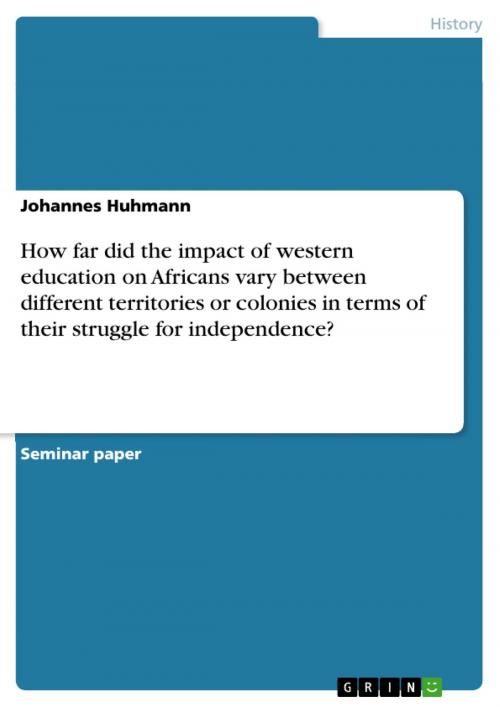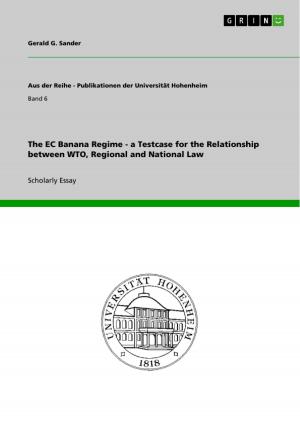How far did the impact of western education on Africans vary between different territories or colonies in terms of their struggle for independence?
Nonfiction, History, Africa| Author: | Johannes Huhmann | ISBN: | 9783638423083 |
| Publisher: | GRIN Publishing | Publication: | October 2, 2005 |
| Imprint: | GRIN Publishing | Language: | English |
| Author: | Johannes Huhmann |
| ISBN: | 9783638423083 |
| Publisher: | GRIN Publishing |
| Publication: | October 2, 2005 |
| Imprint: | GRIN Publishing |
| Language: | English |
Seminar paper from the year 2005 in the subject History - Africa, grade: 71 von 80, University of Manchester (Department of History), course: Nationalism in Twentieth-Century Africa, 10 entries in the bibliography, language: English, abstract: The aim of this essay is to discuss in how far the impact of western education on Africans varied between different territories or colonies in terms of their impact on the emergence of nationalism and the struggle for independence. Education was a major tool in the cultural conquest of Africa and the colonising powers realized this quite early. Missionaries were among the first to make serious efforts to introduce a western style education in the early nineteenth century. To the same extent different colonial powers approached the colonization and administration of their territories differently, approaches to educate the Africans differed. Western education had an impact on the African societies during colonial rule, in the process of decolonization and also in the time after independence. As said, I want to focus on the impact of educational efforts on the struggle for independence and the nationalist movements in Africa. To do this, I chose three territories as case studies which were administered by three different European powers: The Gold Coast, the Ivory Coast and the Be lgian Congo. Methodologically, I opted to work through a list of questions which I grouped into six categories. The questions are: 1. When did education get introduced in this colony? 2. By whom was the education conducted and who had control over it? 3. How was the educational system outlined and how big was the proportion of Africans that were schooled? 4. Where and when was the vernacular, where and when the language of the colonisers used in the educational process? 5. What were the underlying ideologies and colonial policies that determined the education? 6. In what kind of jobs or functions and with what kind of attitudes or orientations did the educated continue their lives when leaving the educational institutions? How did this affect the emergence of nationalism and the struggle for independence?
Seminar paper from the year 2005 in the subject History - Africa, grade: 71 von 80, University of Manchester (Department of History), course: Nationalism in Twentieth-Century Africa, 10 entries in the bibliography, language: English, abstract: The aim of this essay is to discuss in how far the impact of western education on Africans varied between different territories or colonies in terms of their impact on the emergence of nationalism and the struggle for independence. Education was a major tool in the cultural conquest of Africa and the colonising powers realized this quite early. Missionaries were among the first to make serious efforts to introduce a western style education in the early nineteenth century. To the same extent different colonial powers approached the colonization and administration of their territories differently, approaches to educate the Africans differed. Western education had an impact on the African societies during colonial rule, in the process of decolonization and also in the time after independence. As said, I want to focus on the impact of educational efforts on the struggle for independence and the nationalist movements in Africa. To do this, I chose three territories as case studies which were administered by three different European powers: The Gold Coast, the Ivory Coast and the Be lgian Congo. Methodologically, I opted to work through a list of questions which I grouped into six categories. The questions are: 1. When did education get introduced in this colony? 2. By whom was the education conducted and who had control over it? 3. How was the educational system outlined and how big was the proportion of Africans that were schooled? 4. Where and when was the vernacular, where and when the language of the colonisers used in the educational process? 5. What were the underlying ideologies and colonial policies that determined the education? 6. In what kind of jobs or functions and with what kind of attitudes or orientations did the educated continue their lives when leaving the educational institutions? How did this affect the emergence of nationalism and the struggle for independence?















